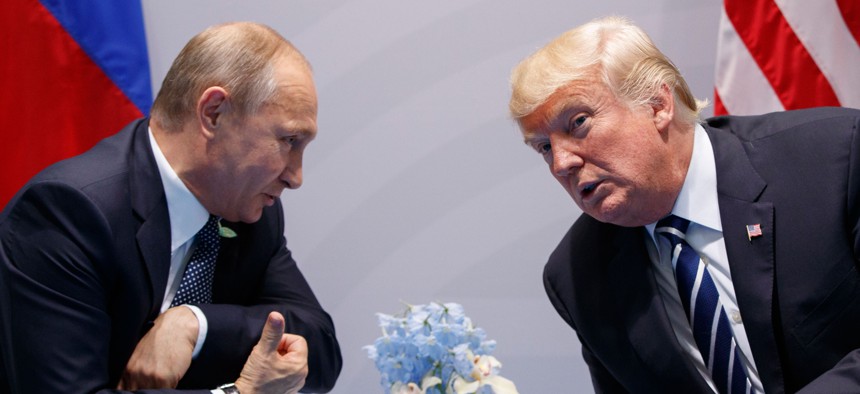Just weeks before his back-to-back summits with nato members in Belgium and Russian President Vladimir Putin in Finland, President Trump is legitimizing Russia’s claim that it did not interfere in the 2016 election, contradicting the conclusions of U.S. intelligence agencies.
The outburst is the latest instance of Trump effectively shunning the conclusions of U.S. intelligence and national-security officials, who in a 2016 report determined that “Putin ordered an influence campaign in 2016 aimed at the U.S. presidential election,” while bolstering Moscow’s denials. Special Counsel Robert Mueller is currently investigating whether the Trump campaign aided that operation, and whether the president attempted to obstruct the inquiry into Moscow’s interference.
The timing of the president’s tweet makes it even more significant: The remark came amid increasing anxiety about next month’s nato summit in Brussels, which will be immediately followed by Trump’s one-on-one meeting with Putin in Helsinki. nato was founded in 1949 as Europe’s answer to the Soviet Union, and the 28-member alliance continues to serve largely as a counterweight to Russia’s ambitions in Eastern Europe. Russia invaded eastern Ukraine and forcibly annexed Ukraine’s Crimean peninsula in 2014, and Poland currently hosts U.S. armed forces and nato units who move between Poland, Estonia, Latvia, and Lithuania in an effort to deter Russian aggression.
Trump has repeatedly praised Putin, and said in November that he “believes” the Russian leader when he says Russia didn’t interfere in the election. He also dismissed objections over Russia’s annexation of Crimea because everyone there “speaks Russian,” according to BuzzFeed. Meanwhile, Trump has reportedly slammed nato as “as bad as nafta,” a trade deal he has repeatedly decried, and did not explicitly endorse Article 5 of nato’s founding document—known as the collective-defense clause, which stipulates that an attack on any member is an attack on all—during last year’s nato summit.
Ivo Daalder, who served as the U.S. ambassador to nato between 2009–2013, told me the “biggest worry in Europe” right now is that Trump “makes unilateral concessions” to Putin following “a confrontational meeting at nato, that exposes disagreement and division among allies.” “None of this would be surprising,” he said.
Foreign policy experts and former nato officials I spoke to said that U.S. allies fear a repeat of Trump’s performance at the G7 summit in Canada, where he attacked Canadian Prime Minister Justin Trudeau just days before meeting with North Korean dictator Kim Jong Un, whom Trump praised as “strong,” “funny,” and “smart.” Trump also made what many considered a unilateral concession to North Korea when he pledged to halt military exercises with South Korea. Trump said Kim Jong Un had promised to denuclearize, but satellite images show the country has continued to upgrade a major nuclear facility.
“Most of the Europeans I’ve spoken to assume we will see a repeat of the G7,” said Julie Smith, a former Defense Department official and director of the Transatlantic Security Program at the Center for a New American Security. “There’s been no consultation on the issues that Trump wants to address with Putin—is it nuclear arms control, which nato members would support, or is it selling our friends in Ukraine upriver and promising to lift sanctions?” The White House has said only that “the two leaders will discuss relations between the United States and Russia and a range of national-security issues.”
“Everybody in this town is worried about the possibility of the North Korea scenario being replayed with regard to Russia,” said Tomáš Valášek, who served as the Slovak Republic’s ambassador to nato between 2013–2017. But he said he believes the analogy is lacking in that Congress has shown a willingness to challenge the president on his Russia policies—lawmakers passed a bill last year, with overwhelming bipartisan support, to impose new sanctions on Russia—and to support nato’s expansion. (Last April, to Russia’s outrage, the Senate approved 97–2 a treaty granting nato membership to the small European nation of Montenegro.)
“Unlike in Korea where the president tried to do what many in nato fear might happen—that is, sign a weak deal with a local troublemaker while seeking to reduce the U.S. military’s regional activities and commitments—Trump would likely run into far stronger congressional resistance this time,” Valášek said.
Still, said former Estonian President Toomas Hendrik Ilves, “there is a lack of predictability after North Korea about what will be agreed to. No one thought that halting military exercises in South Korea was even on the table.” Ilves pointed out that Trump reportedly got the idea from Putin. “I’m hoping that it’s all paranoia,” Ilves said. “But it is a general concern that Putin could dupe Trump by piling on the charm.”



